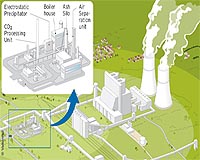 |
London (AFP) Dec 7, 2009 Britain's biggest water company lifted the lid Monday on how it slashed costs by burning customers' faeces to make electricity. Thames Water said "poo power" saved them 15 million pounds (24.6 million dollars, 16.6 million euros) last year by generating renewable energy from the foulest of sources. The company, which handles the waste of 13.6 million people in London and the River Thames valley, said it had met 14 percent of its energy needs by either burning sewage or methane derived from it in 2008-2009. Energy is generated through either "thermal destruction", where dried blocks of "poo cake" are burned, or "anaerobic digestion", where the methane from sewage sludge is burned. "There's no polite way of saying this but what we produce -- our poo -- isn't simply waste, it's a great source of energy," said Keith Colquhoun, Thames Water's climate change strategy manager. "That's good news because we treat 2.8 billion litres of sewage every day at our 349 sewage works. The solids in sewage have a high calorific content that we use to generate electricity." Colquhoun said everyone had to muck in and urged delegates at the UN climate talks in Copenhagen to produce more than just hot air. "It's about all of us taking action -- and in our case, that includes poo power," he said. Share This Article With Planet Earth
Related Links
 Reducing carbon emissions: the options
Reducing carbon emissions: the optionsCopenhagen (AFP) Dec 7, 2009 Here are the main options for tackling greenhouse-gas emissions, listed by order of feasibility: - ENERGY EFFICIENCY: Improve energy efficiency in transport, buildings, appliances, lighting. ADVANTAGE: Can make big, early gains in braking growth in carbon pollution. DISADVANTAGE: Tougher standards may run into opposition from transport lobby, costs may meet consumer resistance. ... read more |
|
| The content herein, unless otherwise known to be public domain, are Copyright 1995-2009 - SpaceDaily. AFP and UPI Wire Stories are copyright Agence France-Presse and United Press International. ESA Portal Reports are copyright European Space Agency. All NASA sourced material is public domain. Additional copyrights may apply in whole or part to other bona fide parties. Advertising does not imply endorsement,agreement or approval of any opinions, statements or information provided by SpaceDaily on any Web page published or hosted by SpaceDaily. Privacy Statement |